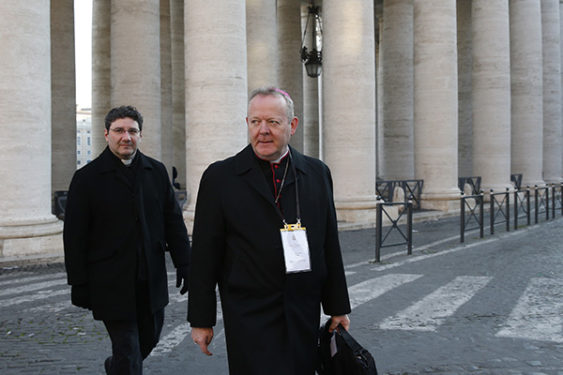
By Charles Collins
LEICESTER, United Kingdom — Ireland’s top prelate warned against an attempt to “hijack” a bill concerning Northern Ireland’s government to legalize abortion in the territory.
Archbishop Eamon Martin of Armagh, the Primate of All Ireland, was speaking July 6 at the Rally for Life in Dublin.
Although the Republic of Ireland legalized abortion after a referendum last year removed pro-life protections in the Irish constitution, abortion remains illegal in Northern Ireland, which is under the jurisdiction of the United Kingdom, and was exempted from the Abortion Act of 1967 that legalized it in the rest of the UK.
On Monday, the UK Parliament is expected to begin considering the Northern Ireland (Executive Formation) Bill, and several amendments have been proposed to implement the Abortion Act in Northern Ireland.
“I am also deeply concerned by suggestions that amendments are being considered to the Northern Ireland (Executive Formation) Bill, going through Westminster on Monday next, which will hijack this bill to remove existing legal protection for unborn babies and to ‘fast track’ the legalization of abortion on demand in Northern Ireland,” Martin told reporters that Saturday. “How tragic it is for humanity that some legislators would ‘fast track’ the ending of the lives of the most defenseless in our society.”
Armagh is in Northern Ireland, and the Irish bishops have a unified bishops’ conference representing the entire Ireland.
Northern Ireland’s self-government – called the Executive – collapsed Jan. 9, 2017, and both the British and Irish governments are trying to re-establish local rule in the province. According to the 1998 Good Friday Agreement, the government in Northern Ireland must include both representatives of the primarily Protestant pro-UK Unionists, and the primarily Catholic Nationalists, which seek a unified Irish republic.
The Good Friday Agreement ended “the Troubles,” 30 years of sectarian violence which led to the deaths of over 3,500 people.
“Like many others I strongly believe that it is urgent to restore an executive in Northern Ireland, so that the common good of all our people can be served. There is something particularly cynical, however, in taking advantage of the present political crisis to remove the right to life of the most vulnerable of our people; the unborn baby. The common good cannot be served in this way,” Archbishop Martin said.
“A legal framework for the protection of unborn human life is an important statement about the respect due to each and every child, and about the society in which we live. I ask Catholics, and all who share our commitment to the right to life, to contact Members of Parliament as a matter of urgency, requesting that he or she vote against any attempt to remove legal protection from unborn babies,”Archbishop Martin continued.
Archbishop Martin’s comments echoed the July 5 statement by Bishop John Sherrington, the lead bishop on pro-life issues for the Conference of Catholic Bishops of England and Wales, who noted the amendments would also affect abortion legislation in the rest of the UK.
“There are likely to be amendments to repeal sections 58 and 59 of the Offences Against the Person Act 1861 which criminalize abortion,” he said.
This law is the one currently in force in Northern Ireland, although parts of the law still apply in other parts of the UK.
“The effect of this in Northern Ireland would be to provide for abortion on demand up to 28 weeks. In England and Wales, it would remove almost all of the existing legal safeguards surrounding abortion which limit abortion.”
Bishop Sherrington noted that such a change would leave Northern Ireland with “a significantly different” abortion framework to the Republic of Ireland, where abortions are only legal up until the 12th week of pregnancy.
Bishop Sherrington said the proposed changes are “the most serious threat to the life of the unborn child in modern times,” and asked all Catholics to contact their Member of Parliament “requesting that they vote against this as a matter of urgency.”
“It would also leave Northern Ireland, England and Wales with some of the most extreme abortion laws in the world, and more than twice the limit of most European countries,” he said. “A legal framework for the protection of unborn human life is an important statement about the respect due to each and every child and about the society in which we live.”
